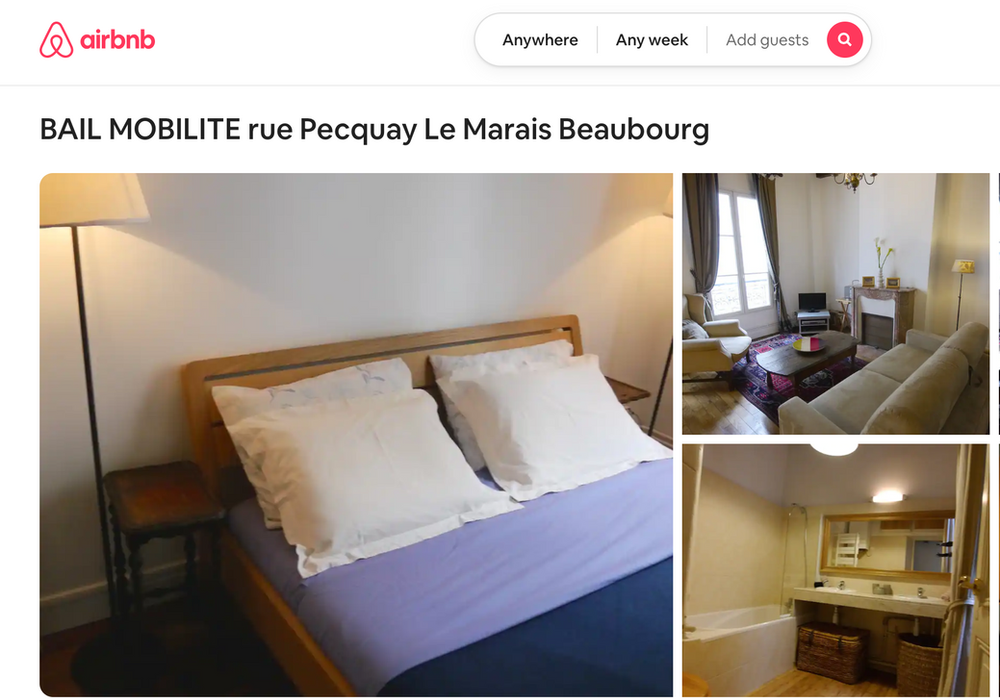Paris Mobility Lease (“Bail Mobilité”): What You Need to Know for Your Next Paris Airbnb Stay

Ah, Paris. The bread, the museums, the bread, the wine, the history, and did I mention the bread? Every time I visit Paris I want to stay longer. I also personally prefer to stay in apartments, as if I’m looking to stay long term in Paris, I want a kitchen (eating out for every meal is still too rich for my blood).
When you search for Airbnbs available for 3 weeks, there’s a handful available, but they’re pricey. When you search for a month, a ton more options appear that are far more affordable(ish). Unfortunately, there’s a French regulation on long term stays that impacts just who can rent these apartments.
Ever Seen “Available with a Mobility Lease Only” on Paris Airbnbs?

If you’ve been hunting for an Airbnb in Paris and stumbled upon the phrase “Available with a mobility lease only (“bail mobilité”)”, you’re not alone. Basically every listing I looked at on Airbnb had this rental requirement listed under “Registration Number”.
But what exactly does it mean, and how do you qualify? It’s fairly opaque; in fact, when I reached out to Airbnb support about it, they were unclear themselves (though I did find this page myself after digging through support docs). Let’s dive into the Paris mobility lease, what it entails, and why the French government introduced it.
What exactly is a Paris Mobility Lease?
A Paris mobility lease is a specific type of rental agreement designed for short-term, furnished apartment rentals in France, particularly for stays ranging from one to ten months. It’s a flexible lease option that doesn’t require a security deposit, making it ideal for temporary residents such as students, interns, and professionals on short assignments.
Why Was the Paris Mobility Lease Introduced?
Airbnb often introduces a very real problem in cities: housing shortages. Rather than real people renting out their apartments (which was, perhaps, the original intention of Airbnb), corporations will buy properties and rent them to tourists. This diminishes the supply for people actually trying to live and work in that city.
The French government implemented the Paris mobility lease in 2018 to address some of these housing challenges. Overall the mobility lease aims to:
- Facilitate accessto temporary housing for students, interns, and professionals.
- Prevent housing shortages by making it easier for landlords to rent out their properties for short periods.
- Regulate the market to ensure fair rental practices and availability.
In my opinion, this doesn’t stop corporations from buying properties and it doesn’t make properties more available to locals, since you have to be on temporary assignment to qualify (more on that below). It does make hotels more profitable though as it lesses the number of Airbnbs available to tourists. It’s worth nothing that mobility leases are not subject to tourism taxes, so it does seem fair that if you’re planning to visit Paris as a tourist, you pay the subsequent tax (which I found to be ~€500 for a 3 week stay).
Key Features of the Mobility Lease
- Duration: 1 to 10 months (this is why it has impacted the Airbnb market so significantly if you’re looking for one-month stays).
- Furnished Apartments: The lease applies only to fully furnished apartments.
- No Security Deposit: Unlike traditional leases, you don’t need to put down a security deposit.
- Renewal and Termination: The lease cannot be renewed beyond ten months, but it can be terminated early with a one-month notice period.
How Do You Qualify For a Mobility Lease in Paris
To qualify for a mobility lease, you must fit into one of the following categories:
- Students enrolled in higher education institutions.
- Volunteers or those on national service.
- Professionals on temporary assignments.
- Individuals undergoing professional training or education.
You may be asked to provide documentation, such as a student ID, internship agreement, or work contract (including official signature and stamp), to prove your eligibility.
Unfortunately being a digital nomad does not count. You must be on a required assignment in Paris with corporate documents to prove it.
Where to Stay in Paris Instead – The Top Hotels in Paris
I have stayed in a few hotels in my time in Paris, ranging from budget to luxury, most of which I would happily return to. If you’re looking for a hotel, these are the ones I would recommend:
Hotel | Why I Like it | Stars | Budget | Booking Link |
Hôtel National Des Arts et Métiers | This hotel is absolutely beautiful, from the furniture to the bathroom design, and has surprisingly large rooms for a Parisian hotel. I did not want to check out. | $$$$ | ||
Hyatt Regency Paris Etoile | This hotel is a traveler favorite due to it’s relative affordability (and you can book on points!) and stunning balcony views | $$$ | ||
Hotel De l’Empereur Paris | This hotel is gorgeous, albeit with typically European small rooms, and in close proximity to the Eiffel Tower. Perfect for touristing. | $$$ | ||
Hotel Lorette – Astotel | I honestly loved staying in this budget hotel. Yes, the rooms are small, but the adorable cave where breakfast was served made my heart sing and it’s in a great neighborhood. | $$ |
TL;DR: Paris Mobility Lease
- Finding a month long stay in Paris is extremely difficult without a mobility lease
- You must be on official work or student assignment in Paris to qualify, and being a digital nomad doesn’t count
- If you are visiting for tourism purposes, you’re best off looking for 3 week stays and knowing that you’ll pay €500 in taxes
- Alternatively, there are some beautiful hotels that won’t break the bank (and many that will) to consider!
Overall, I think a trip to Paris is still worth it (have I mentioned the bread there?), and hopefully this clears up any confusion you might have!
Cheers to your next adventure ✈️🥂






